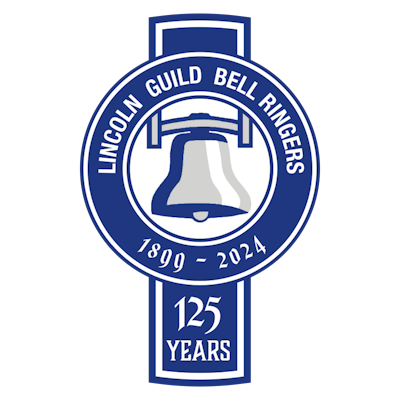Guild AGM 2012 - 28th April 2012
The AGM this year followed the now familiar format of ringing at the Cathedral at 09:30 prior to the communion service in the Ringer's Chapel at 10:00. There were only 38 communicants this year, very much down on last year's figure of 50. The Very Reverend Philip Buckler, Dean of Lincoln Cathedral and of course President of the Lincoln Diocesan Guild of Church Bell Ringers, conducted the communion service.
We were again fortunate this year to have use of Bailgate Methodist Church's facilities for the meeting and lunch. The meeting was conducted in the body of the Methodist Church itself.
The main points are as follows
The General fund is down as is the number of members (4%? decline in numbers). This down turn has been anticipated by the Treasurer and been allowed for, but it does highlight a worrying trend. The Bell Repair Fund by contrast is doing very nicely.
Trevor Hardcastle has stood down as Reports Secretary and John Nicholson has been elected in his place.
2013 subscriptions remain the same as this year. Adult £10, Junior £3 and Associate/non resident life member £5. Peal booking fee will remain at 25p. The 2012 quota will be General Fund 45%, Bell Repair Fund 40% and the branches to retain 15%.
The key part of the meeting were the three presentations, one on the work of the Ringing Foundation by Robin Heppenstall, one on Change Ringing for the Future, by Alan Payne and one on the Integrated Teacher Training Scheme by Sue Faull.
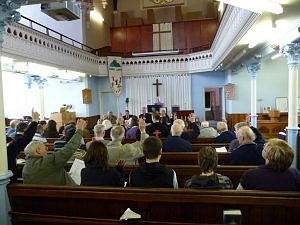 The meeting |
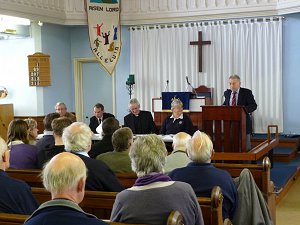 Left to Right : Roger Lord (Treasurer), Alan Payne (Master), The Dean (President), Sandra Underwood (Secretary) and Robin Heppenstall |
Robin's address told of the formation of the Ringing Foundation. It is independent from any Central Council committee group, which gives it much more flexibility. It none-the-less works with the Central Council towards the common goal of promoting the art of bellringing. It provides a lot of support such as dedicated centres of excellence and the ITTS scheme. In return it deserves support from the members be it financial or in the form of voluntary work.
Alan's report painted a somewhat grim picture of ringing in decline. Numbers are falling, not just in our Guild either. The Guild needs to re-invent itself like some other organisations that were in a steep decline. Obvious examples are the Scout movement and the National Trust. We need to do the same. So he asks the simple and straightforward question "What do you want the Guild to become?" This is not a rhetorical question either. Alan is genuinely wanting people to get in touch either with himself or to any Branch or Guild official so that the thoughts of the members can be collected and analysed. Whatever work we undertake, it is likely to be the "groundtroops" of the local towers or at least the branches that put it into good practice, rather than effort taking place at the higher Guild or National level. It is going to be the training of new ringers that is in part key to the success of the Guild and ensuring that learners do not lose heart is very important. The other thing that is key to the success of the Guild is retention of existing ringers.
Sue Faull outlined the success of the two ITTS (Integrated Teacher Training Scheme) Module 1s that have taken place at Wragby. A further Module 1 (teaching bell handling) will take place at the end of May with a Module 2 (Teaching elementary change ringing) planned for later in the year. People interested should get in touch with Sue or their Branch Secretary. The ITTS scheme develops a structured approach to the teaching of ringing. This has been developed by a physiotherapist who learnt to ring for the Millennium initiative. Her own experience of learning to ring was not as good as it might have been and she could see why people might give up ringing due to poor handling impeding progress. However once she had established herself as a ringer she examined the teaching method, utilising her own experiences of teaching patients how to develop themselves when recovering from, say, an injury. The result is a methodical approach that follows the steps in a set sequence so nothing is left out. Even experienced ringers and teachers who have been on the course have been very positive about it, saying that they benefited from it. So what of the traditional role of the tower captain as the instructor? Is that under threat? No! Not a bit. In fact we need tower captains to carry on teaching and we need experienced teachers to become Mentors for trainee teachers. However it would be nice if in 20 years time (this is a long term strategy) if there was at least one person in a tower who is ITTS trained and accredited.
Some future activities were outlined. These were as follows
The 100 club draw was held, the results of which can be found here.
The meeting closed with a vote of thanks from Sue Faull. The members moved into the main hall for an excellent buffet lunch, that had been organised by Dot Mason and her band of helpers. Many thanks to them.
The day's activities resumed in the afternoon at 14:00 with ringing at St. Giles, Lincoln where the Prize Draw took place.
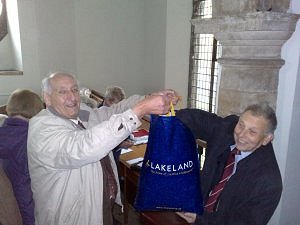
Robin draws the winning ticket
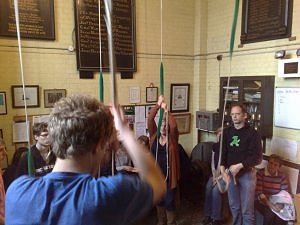 Ringing at St. Giles |
Ringing at St. Giles |
More ringing took place later at the Cathedral up until 17:30 when many members descended the tower to attend evensong in the St, Hugh's Choir at the Cathedral.
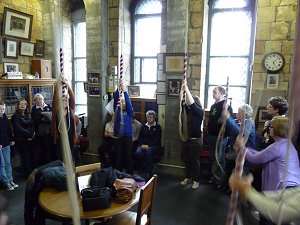 Ringing at the Cathedral |
Ringing at the Cathedral |
Additional ringing took place in the evening at Thorpe on the Hill and also at Eagle where refreshements were served.
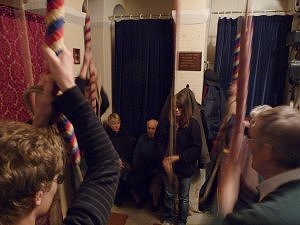 Ringing at the Thorpe on the Hill |
Ringing at Thorpe on the Hill |
Ringing at Eagle
I'm confident that an excellent day was enjoyed by everyone who attended. Many thanks all those who strived to make it such an excellent day.
Jonathan Clark (Webmaster)
